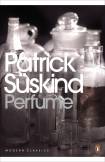 Perfume is one of those books I had heard of by reputation, but didn’t actually know anything about. And now I’ve read it… well, it’s not what I was expecting, but it’s good. I liked it, but saying so feels a little uncomfortable — as well it ought!
Perfume is one of those books I had heard of by reputation, but didn’t actually know anything about. And now I’ve read it… well, it’s not what I was expecting, but it’s good. I liked it, but saying so feels a little uncomfortable — as well it ought!
Patrick Süskind tells the story of Jean-Baptiste Grenouille, a man with a preternaturally acute sense of smell, but no human odour of his own. Growing up in eighteenth-century Paris, Grenouille begins as a tanner’s apprentice, but soon inveigles his way into the employ of Giuseppe Baldini, the renowned perfumer. Baldini has fallen on hard times, but Grenouille’s unparalleled instinct for concocting scents turns the perfumer’s fortune around, and Jean-Baptiste is subsequently able to leave and become a journeyman.
Over the years, Grenouille learns more of the techniques of perfume-making, and discovers how to manufacture scents that can provoke a certain reaction in people — he can go unnoticed by people, or catch their attention, as he desires. But Grenouille’s wish is for the greatest of all perfumes, the one which will make him adored by — and hence gain power over — all. The secret ingredient of this scent is the essence of innocent girls — and so the murders begin…
Süskind pulls off a very difficult feat in Perfume, which is to write a book about an utterly vile and unsympathetic character, and make it compulsively readable. This is in large part down to his prose style (and, by extension, to John Woods’ excellent translation), which has the feel and quality of a myth or fairytale. The paragraphs are often long, the description often detailed; but in a way that offers depth and flow rather than weighing the narrative down. Süskind is particularly good (as one would hope and expect) at evoking smells: his opening pages are a useful reminder that eighteenth-century European cities would have stunk; more generally, he emphasises the importance of a sense that’s all too easy to forget about when writing and reading fiction.
As a character, Jean-Baptiste Granouille is someone you’d hope never to encounter, the kind of person you’d hope could never even exist. He’s single-minded to the point that his entire being is distorted by his obsession. All this makes Grenouille extremely difficult to empathise with; and the author makes little attempt to help us. Süskind does a lot of telling rather than showing, which has the effect of sealing Grenouille inside his own mind. Even though we see his deepest imaginings, Grenouille remains a cold and distant figure. This is quite deliberate, I’m sure, and in keeping with that fairytale style; it pushes the story slightly out of reality.
Then comes the uncomfortable question: does Perfume make light of mass murder, or at least fail to take it seriously enough? On balance, I would say not; though the issue is thorny. Grenouille gets his comeuppance in the end, but it’s a fairytale kind of comeuppance. I don’t think Süskind dwells gratuitously on the killings, but there is a nagging sense that the idiom in which he’s chosen to write doesn’t allow him to treat the situation with the gravity it deserves.
Still, I think Perfume is a powerful book. Yes, it’s pretty much geared towards doing one thing and one thing only — but it does that thing very well indeed. The book kept me reading to the end, and left me thinking about it afterwards; which is a fine outcome for the reading of any novel.
Recent Comments